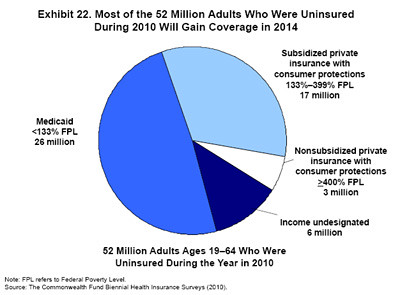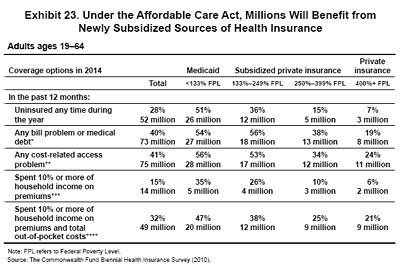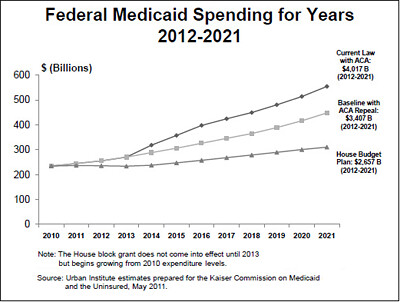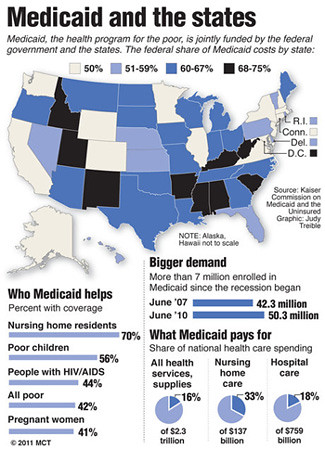A new study last week from the Commonwealth Fund confirmed the shocking gap between lower and higher income Americans when it comes to health insurance coverage. While only 12 percent of families making $89,400 a year (or four times the federal poverty rate for a family of four) was uninsured at some point last year, that figure skyrockets to 57 percent for a family at about $29,700. Mercifully, thanks to the Affordable Care Act (ACA), beginning in 2014 that gap will largely be erased. Unless, that is, Republicans take control of the White House and Congress. If the GOP succeeds at the polls in 2012, the health insurance income gap will get much, much worse.
Last March, a previous Commonwealth Fund study found that since the start of the recession, almost 60% of Americans who lost a job and their health insurance - 9 million people - could not afford to regain coverage. Medical costs pushed four million more into bankruptcy. Its 2010 Biennial Health Insurance Survey of over 3,000 adults ages 19-64 highlighted the devastating toll of the Bush recession which started in December 2007:
Both insured adults--who are facing higher premiums and out-of-pocket costs--and uninsured adults cannot afford adequate health care. Seventy-five million adults did not get needed health care in 2010, skipping doctor visits, prescriptions, specialist care, and recommended tests and treatments because of costs. This represents a 60 percent increase from 2001, when 47 million people reported skipping needed care because of costs. Uninsured adults were the most likely to forgo care because of costs, with 66 percent reporting they did so. However, many insured adults were also less insulated from high health care costs--31 percent of adults who were insured all year went without the health care they needed because of costs, up from 21 percent in 2001.
Likewise, 73 million people reported problems paying their medical bills or were paying off medical debt, up from 58 million in 2005. The survey finds that because of medical bills, an estimated 29 million people spent all of their savings, 17 million incurred credit card debt, 22 million were unable to pay for basic necessities like food, heat, and rent, and 4 million declared bankruptcy.
Now, a new Fund analysis revealed the yawning chasm that constitutes the "Income Divide in Health Care":
The new Commonwealth Fund Health Insurance Tracking Survey of U.S. Adults finds nearly three of five adults in families earning less than 133 percent of the federal poverty level were uninsured for a time in 2011; two of five were uninsured for one or more years. Low- and moderate-income adults who were uninsured during the year were much less likely to have a regular source of health care than people in the same income range who were insured all year.
As Sarah Kliff of the Washington Post explained, "This underscores how central the health reform law's expansion of Medicaid -- in which anyone below 133 percent of the poverty line qualifies for the program -- will be to the law's expanded coverage. Everyone represented by the yellow triangles above becomes eligible for Medicaid in 2014."
But the reach of the Affordable Care Act doesn't end there.
As the Fund's analysis showed, thanks to Affordable Care Act the vast majority of the 52 million adults lacking health insurance in 2010 will gain coverage beginning in 2014. Millions more will benefit as their ability to absorb the price of annual premiums and out of pocket costs improves.
As the Commonwealth Fund President Karen Davis explained last year, the new consumer protections, insurance requirements and government subsidies contained in the health care reform law signed by President Obama in March 2010 will help ensure that nearly everyone, including the jobless, has access to comprehensive coverage by 2014:
"The silver lining is that the Patient Protection and Affordable Care Act has already begun to bring relief to families," she said. "Once the new law is fully implemented, we can be confident that no future recession will have the power to strip so many Americans of their health security."
Confident, that is, unless the Republicans win in November.
After all, the Paul Ryan budget which 235 House Republicans and 40 GOP Senators voted for last year calls for repealing "Obamacare," slashing $1.4 trillion in Medicaid spending over the next decade and handing over what funding remains as block grants to the states. In May, the Kaiser Family Foundation detailed the Ryan plan's devastating impact:
Projected federal spending on Medicaid for the 10-year period 2012 to 2021 would fall by $1.4 trillion, a 34 percent decline. By 2021, states would receive $243 billion less annually in federal Medicaid money than they would under current law, a 44 percent reduction.
The effect on enrollment in state Medicaid programs could vary widely. By 2021, between 31 million and 44 million fewer people nationally would have Medicaid coverage under the House Budget Plan relative to expected enrollment under current law, the analysis finds, examining three possible scenarios using different assumptions about how states might respond to lower federal funding. Most of those people, given their low incomes and few options for other coverage, would end up uninsured.
In one form or another, all of the 2012 Republican presidential candidates offer a similar recipe for disaster. For example, Mitt Romney, whose 2006 health care reform law reduced his state's uninsured rate to a national best of 2 percent, would repeal the ACA, gut Medicaid spending by $700 billion and deliver what's left as block grants to the states. (Apparently, Romney wasn't kidding when he later announced, "I'm not concerned about the very poor.") Even Chris Wallace of Fox News was alarmed at the impact:
WALLACE: But you don't think if you cut $700 billion dollars in aid to the states that some people are going to get hurt?
ROMNEY: In the same way that by cutting welfare spending dramatically, I don't think we hurt the poor. In the same way I think cutting Medicaid spending by having it go to the states run more efficiently with less fraud, I don't think will hurt the people that depend on that program for their healthcare.
But what's already happening in the states shows that Mitt Romney is wrong. The $300 billion federal Medicaid program covers between 50 and 75 percent of state Medicaid spending. Medicaid not only pays for a third of nursing home care in the United States; it covers a third of all childbirths. (In Texas, the figure is one-half.) As with Medicare, Medicaid provides insurance for substantially less than private insurers (27% less for children, 20% for adults.) But as Ezra Klein explained in May, many governors - most of them Republican - are already taking the ax to Medicaid spending:
Twenty states implemented benefit restrictions in the past year. In fiscal year 2010, 39 states implemented Medicaid provider rate cuts or freezes (up from 33 in fiscal year 2009), and 37 states have provider rate restrictions planned for the next fiscal year.
The GOP's desired shift to block grants, Jonathan Cohn suggested last year, would almost certainly produce a death spiral for Medicaid and the millions of Americans whose health care depends on it:
If the law changes and Medicaid becomes a block grant, then every year the federal government would simply give the states a lump sum, set by a fixed formula, and let the states make the most of it. Conservatives claim block grants would give states the flexibility they need to make their programs more efficient. But, as Harold Pollack has noted in these pages, states already have some flexibility. And because demand for Medicaid tends to peak during economic downturns, when state tax revenues fall, the likely impact of a block grant scheme would be to make Medicaid even less affordable at the time it is most necessary.
That's not to say plenty of governors wouldn't take advantage of block grant status to change their Medicaid programs in ways they cannot now. They surely would--by capping enrollment, thinning benefits, increasing co-payments, and so on.
That's why the stakes are so high in November. If President Obama and his Democratic allies maintain power, the national shame that is the American health insurance income gap will become a thing of the past. But if the Republicans win, millions of Americans will lose.
(This piece also appears Perrspectives.)





















